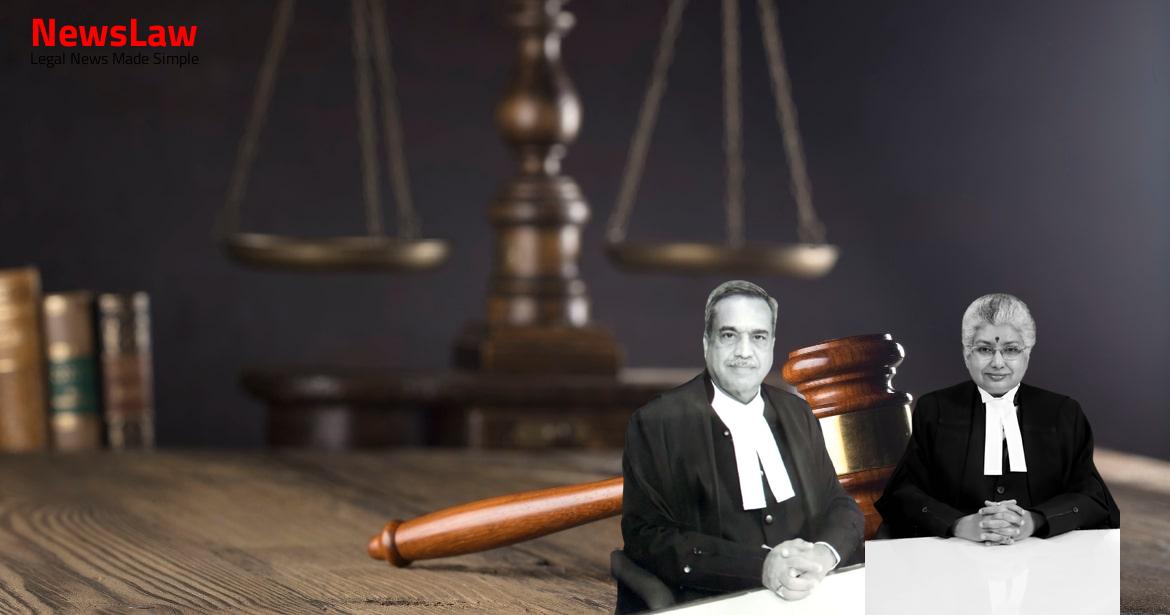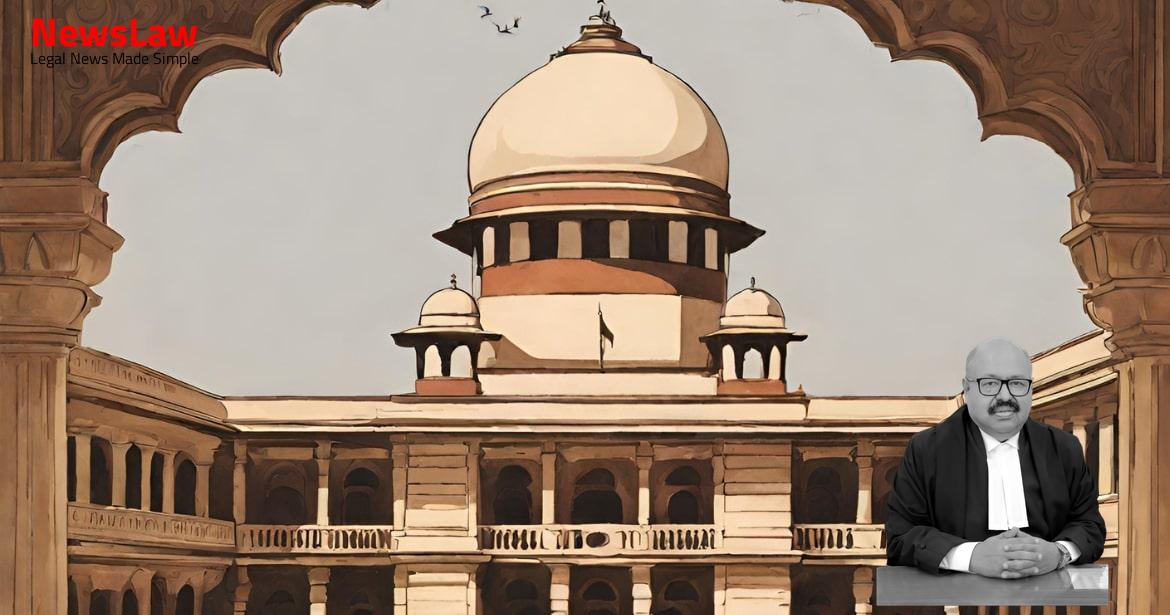This summary focuses on a legal case involving the dismissal and subsequent reinstatement of an employee. The court’s analysis sheds light on the nuances of misconduct, the impact of acquittal in criminal proceedings on disciplinary actions, and the criteria for determining shockingly disproportionate punishment. Stay tuned to understand how legal principles shape the outcomes of complex employment disputes.
Facts
- The driver of the jeep sustained injuries in the accident
- He was dismissed from service after the enquiry
- The driver was later acquitted
- He was also prosecuted under Section 279 of IPC for the offence
- Instead of taking the bus to the left side, the driver took it to the extreme right which led to the collision
- The collision resulted in the death of four passengers on the spot and serious injuries to six others
- The jeep and the bus suffered significant damage with the jeep’s radiator, engine board broken and inside crushed, and the bus’s bumper crushed
- The impact of the collision pushed the jeep back by about 25 feet
- The driver challenged his dismissal before the Labour Court
- No back wages were pressed for by the respondent/workman before the Industrial Tribunal
- The respondent was a driver for the Maharashtra State Road Transport Corporation (MSRTC) and was involved in an accident while driving a bus in 1992.
- The Industrial Tribunal considered the acquittal of the respondent in criminal proceedings and noted contributory negligence by both drivers involved in the accident.
- The Industrial Tribunal utilized powers under item No.1(g) of Schedule-IV of the MRTU and PULP Act, 1971 to set aside the dismissal of the respondent and ordered his reinstatement with continuity of service.
- The appellant, MSRTC, challenged this decision in a writ petition before the High Court, which ultimately dismissed the petition and upheld the reinstatement with back wages from 01.11.2003 to 31.05.2018.
- The High Court also directed the appellant to provide the respondent with retiral benefits based on continuity of service.
Also Read: Ruling on Circumstantial Evidence in Murder Case
Arguments
- The Labour Court rightly held that the acquittal in the criminal case would not rescue the respondent as the acquittal was due to failures of the prosecution to prove the case beyond doubt.
- Misconduct was proved in the departmental proceedings despite the acquittal in the criminal case.
- The Industrial Court found no victimization by MSRTC and stated that the action taken was in good faith.
- MSRTC did not falsely implicate the respondent nor dismiss him for false reasons, as observed by the Industrial Court.
- The case does not fall under item No.1(g) of Schedule-IV of the MRTU and PULP Act, 1971.
- The respondent was involved in a vehicle accident where four persons died due to negligence. He had been punished four times earlier for misconduct.
- The Industrial Court observed that the misconduct was not minor or technical in nature.
- The order of reinstatement was deemed unwarranted as the respondent was gainfully employed after dismissal.
- The acquittal in the criminal case does not affect the disciplinary proceedings as the standards of proof differ in both cases.
- The punishment of dismissal was not shockingly disproportionate in this case.
- The Industrial Court erred in interfering with the dismissal order on the ground of shockingly disproportionate punishment.
- The High Court and the Industrial Court failed to distinguish between the disciplinary enquiry and the criminal proceedings.
- Undue importance was given to the acquittal in the criminal case by the High Court and the Industrial Court.
- The learned counsel representing the respondent supports the judgement of the Industrial Court and High Court.
- The direction given by the High Court in the impugned judgment for the appellant – MSRTC to pay back wages from November 2003 to May 2018 is argued to be beyond the scope of the writ petition filed by the appellant – MSRTC.
- It is contended that the dismissal order being found disproportionate to the misconduct can be considered an unfair labour practice according to item No 1(g) of Schedule-IV of the MRTU & PULP Act, 1971.
- Based on the above arguments, the appellant requests the appeal to be allowed.
Also Read: Challenging Legal Presumptions in Negotiable Instrument Cases
Analysis
- Industrial Court rightly interfered with the order of dismissal and the same was rightly confirmed by the High Court.
- Labour Court did not agree with the argument that acquittal by criminal court absolves guilt in disciplinary proceedings.
- Misconduct of driving rashly and negligently leading to an accident causing four deaths was proved in departmental proceedings.
- The punishment of dismissal was considered shockingly disproportionate by the Industrial Court based on clause No.1(g) of Schedule-IV of the MRTU & PULP Act, 1971.
- The criminal court acquitted the respondent due to various reasons like witness hostility and insufficient evidence.
- The accident occurred due to the respondent driving at high speed and rashly, leading to the unfortunate deaths.
- Clause No.1(g) of Schedule-IV of the MRTU & PULP Act, 1971 prohibits dismissal for misconduct of a minor or technical nature without considering the specific misconduct and the employee’s past record.
- In the present case, the dismissal of the respondent cannot be categorized under misconduct of a minor or technical nature as per the mentioned clause.
- The dismissal must be evaluated in light of the nature of the misconduct and the employee’s service record to determine if it is shockingly disproportionate.
- The directions issued in para 8 of the impugned judgment are beyond the scope of the controversy before the High Court and cannot be sustained.
- The High Court’s directions to the appellant to pay wages to the respondent workman for a specific period could not have been passed in a writ petition.
- The Industrial Court did not interfere with the findings of the enquiry officer in the departmental proceedings.
- The Industrial Court exceeded its jurisdiction by interfering with the order of dismissal passed by the disciplinary authority, which was not challenged by the Labour Court.
- The respondent workman admitted to being gainfully employed after the dismissal, making reinstatement with continuity of service unwarranted.
- The petition was not filed by the workman, and the reinstatement was not necessary in this case.
Also Read: Legal Analysis Critique in High Court’s Quashing Order
Decision
- The order of dismissal of the respondent-workman is upheld.
- The appeal is allowed to the extent of upholding the dismissal order.
- The judgments of the Industrial Court and the High Court are quashed and set aside.
- The judgment and award of the Labour Court in Complaint No. 96 of 1993 are restored.
- The present appeal succeeds.
- No order as to costs.
Case Title: MAHARASHTRA STATE ROAD TRANSPORT CORPORATION Vs. DILIP UTTAM JAYABHAY (2022 INSC 5)
Case Number: C.A. No.-007403-007403 / 2021



